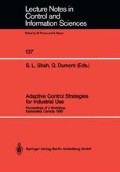Abstract
Adaptive controllers with linear estimators are often implemented on processes that exhibit nonlinear, nonstationary behavior. As a result, the sensitivity of these estimators must be continually adjusted to remain responsive to current process behavior. This work takes a novel approach to the practice of adjusting sensitivity. Here, the recent behavior of the process is used as the primary indicator for making decisions about when and how to make such adjustments. The diagnosis of process behavior is made at a qualitative level to place current operation into one of several categories. An inferencing system directs the diagnosis and uses the result to implement appropriate adjustment actions. The result is a preemptive action that indicates improved controller reliability. A preliminary validation is presented in the adaptive control of a nonlinear reactor simulation.
Preview
Unable to display preview. Download preview PDF.
Abbreviations
- ai :
-
Parameters corresponding to system output, yi
- bi :
-
Parameters corresponding to system input, ui
- CA :
-
Concentration of species A in reactor
- ci :
-
Parameters corresponding to the system noise, vi
- d:
-
Unmeasured disturbance variable
- F:
-
Flow in reactor
- J:
-
Objective function, defined in Eqn (5) and (8)
- k:
-
Dead time expressed as a multiple of sampling period, Δt
- Kp :
-
Steady state process gain
- ko :
-
Reaction rate constant
- m:
-
Order of input in the ARMAX model in Eqn (1)
- n:
-
Order of output in the ARMAX model in Eqn (1)
- P:
-
Covariance matrix, defined in Eqn (7)
- Q:
-
penalty on incremental input change, defined in Eqn (11)
- t:
-
Integer number representing the sampling instant
- td :
-
Process dead time
- Δt:
-
Sampling period for estimator and controller
- u:
-
Process input variable
- V:
-
Reactor volume, Defined in Eqn (13)
- y:
-
Process output variable
- y′:
-
Estimate of output y
- y fsp :
-
Filtered setpoint, defined in Eqn (9)
- ysp :
-
Controller setpoint
- α:
-
Filter rate parameter used in Eqn (9)
- ε:
-
Error of estimation in Eqn (4)
- ψ:
-
Vector of inputs and outputs, defined in Eqn (4)
- τ i :
-
Process time constants in Eqn (12)
- θ:
-
Vector of the coefficient parameters, defined in Eqn (3)
References
Astrom, K. J., and B. Wittenmark, "On Self-Tuning Regulators," Automatica, 9, 185 (1973).
Clarke, D. W., and P. J. Gawthrop, "Self-Tuning Control," Proc. of IEEE, 126, 633 (1979).
Clarke, D. W., "Introduction to Self-Tuning Controllers," in Self-Tuning and Adaptive Control: Theory and Applications, [Harris and Billings, Ed.], ch. 2, Peregrinus, London (1981).
Fortescue, T. R., L. S. Kershenbaum, and B. E. Ydstie, "Implementation of Self-tuning Regulators with Variable Forgetting Factors," Automatica, 17, 831 (1981).
Goodwin, G. C., H. Elliot and E. K. Teoh, "Deterministic Convergence of a Self-Tuning Regulator With Covariance Resetting," Proc. of IEEE, 130, 6 (1983).
Goodwin, G. C., and K. S. Sin, Adaptive Filtering Prediction and Control, Prentice-Hall, Englewood Cliffs, New Jersey (1984).
Goodwin, G. C., D. J. Hill and M. Palaniswami, "Towards a Robust Adaptive Controller," Proc. of IFAC Conf. on Identification and System Parameter Estimation, York, U. K. 997 (1985).
Ljung, L., and T. Soderstrom, Theory and Practice of Recursive Identification, MIT Press, Cambridge, Massachusetts (1983).
Ortega, R., L. Praly and I. D. Landau, "Robustness of Discrete-Time Adaptive Controllers," IEEE Trans. on Automatic Control, 30, 1179 (1985).
Scborg, D. E., T. F. Edgar, and S. L. Shah, "Adaptive Control Strategies for Process Control: A Survey," AIChE J., 32, 881 (1986).
Shah, S. L. and W. R. Cluett, "RLS Based Estimation for Self-Tuning Control," Proc. 1987 Annual AIChE Meeting, New York, N. Y. (1987).
Stephanopoulos, G., Chemical Process Control: An Introduction to Theory and Practice, Prentice-Hall, Englewood Cliffs, New Jersey (1984).
Vogel, E. F., and T. F. Edgar, "Application of An Adaptive Pole-Zero Placement Controller to Chemical Processes with Variable Dead Time," Proc. Amer. Control Conf., Arlington, VA, 536 (1982).
Ydstie, B. E., L. S. Kershenbaum and R. W. H. Sargent, "Theory and Application of an Extended Horizon Self-Tuning Controller," AIChE J., 31, 1771 (1985).
Author information
Authors and Affiliations
Editor information
Rights and permissions
Copyright information
© 1989 Springer-Verlag
About this paper
Cite this paper
Cooper, D.J., Lalonde, A.M., Pae, R. (1989). Symbolically enhanced parameter estimation for reliable adaptive control. In: Shah, S.L., Dumont, G. (eds) Adaptive Control Strategies for Industrial Use. Lecture Notes in Control and Information Sciences, vol 137. Springer, Berlin, Heidelberg. https://doi.org/10.1007/BFb0042943
Download citation
DOI: https://doi.org/10.1007/BFb0042943
Published:
Publisher Name: Springer, Berlin, Heidelberg
Print ISBN: 978-3-540-51869-3
Online ISBN: 978-3-540-46833-2
eBook Packages: Springer Book Archive

